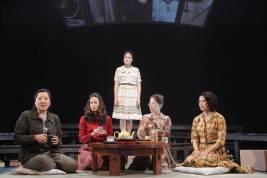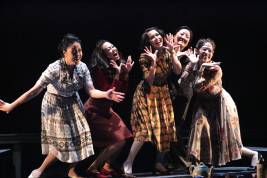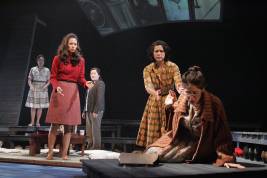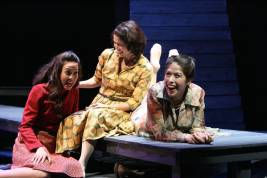
When Velina Hasu Houston’s Tea was first staged back in 1987, the playwright could scarcely have imagined that one night, twenty-five years later, her poetic tribute to her mother and the 100,000 other Japanese “war brides” who came to the U.S. after World War II would one night become Tea, With Music, an exquisite new chamber musical now getting its World Premiere production by East West Players.
 Houston’s original cast of characters stays the same. There’s Atsuko (Tiffany-Marie Austin), the Nagoya-born widow of Japanese-American Kazuhiro Yamamoto; Chizuye (Janet Song), born in Yokohama and married to Mexican-American Gustavo Juarez; Setsuko Banks (Yumi Iwama), the Kobe native who wed an African-American “the color of soy sauce”; Teruko (Jennie Kwan), who left her hometown of Fukuoka to become the bride of blond blue-eyed Texan Curtis Mackenzie; and last but hardly least, Himiko Hamilton (Joan Almedilla), whose recent suicide followed the death of her abusive husband (by Himiko’s own hand) and the rape-murder of her teenage daughter Mieko.
Houston’s original cast of characters stays the same. There’s Atsuko (Tiffany-Marie Austin), the Nagoya-born widow of Japanese-American Kazuhiro Yamamoto; Chizuye (Janet Song), born in Yokohama and married to Mexican-American Gustavo Juarez; Setsuko Banks (Yumi Iwama), the Kobe native who wed an African-American “the color of soy sauce”; Teruko (Jennie Kwan), who left her hometown of Fukuoka to become the bride of blond blue-eyed Texan Curtis Mackenzie; and last but hardly least, Himiko Hamilton (Joan Almedilla), whose recent suicide followed the death of her abusive husband (by Himiko’s own hand) and the rape-murder of her teenage daughter Mieko.
Like the straight play on which it is based, Tea, With Music provides us with informative, frequently amusing, often quite moving glimpses into the lives led by these five women following their arrival at one of the remote, rural Kansas forts where the Army sent Japanese-based servicemen who had met and married “Oriental” women in the decade and a half following the war. From romantic first meetings (Teruko’s future husband came to her barbershop so many times that she wondered if “soon he will have no hair left”) to their families’ reactions (Himiko’s father shouted “Shame! Shame!” at the sight of his daughter’s Yankee-gaijin baby) to the horrified reactions of the Kansas locals to the women’s interracial marriages (Setsuko soon learned the meaning of “We reserve the right to refuse service”), Tea, With Music gives voice to the women of this little-known page in American history.
 We also get to meet the five brides’ “war grooms” and the couples’ half-American, half-Asian “Hapa girl” daughters, all of them portrayed by the five cast members.
We also get to meet the five brides’ “war grooms” and the couples’ half-American, half-Asian “Hapa girl” daughters, all of them portrayed by the five cast members.
What sets musical apart from source material are the thirty-five minutes of song which have replaced an equal length of the play’s original dialog, beautiful melodies by composer Nathan Wang and mostly deft lyrics by the playwright herself.
The song “Tea” opens and closes Tea, With Music with an invitation to share “a cup of tea long overdue for us. Not too hot. Just hot enough to singe the tongue.” “Ban, Ban, Ban” (Japanese for bang-bang-bang) has Himiko describing the shooting death of her onetime “American Galahad.” In “Father Forgive Me,” the five young brides ask forgiveness of Japanese parents unable to understand their daughters’ decision to marry The Enemy. “This Is My Country” contrasts the women’s new lives in the “foreign land that conquered and won us” with their past lives in Japan. “Mieko, Mieko” gives us a mother who doesn’t know what to do now that her murdered daughter’s laughter no longer “drowns out the rain.”
 Staged with imaginative vision by director extraordinaire Jon Lawrence Rivera, Tea, With Music unfolds on John H. Binkley’s artfully designed multi-leveled Asian-esque set, above which projection designer Adam Flemming’s gorgeous panoply of images “unfold” on fan-like screens. Lighting designer Adam Blumenthal bathes Binkley’s set and costume designer Mylette Nora’s excellent, mostly mid-20th-Century western outfits in a nostalgic, golden glow, with the exception of the stark white light which illuminates the women’s ghostly visitor. Ken Takemoto’s props are, not surprisingly, another design star in this musical in which so much revolves around the importance of tea in these women’s lives. Add to this Bob Blackburn’s highly effective sound design and you have one of the best design packages in town.
Staged with imaginative vision by director extraordinaire Jon Lawrence Rivera, Tea, With Music unfolds on John H. Binkley’s artfully designed multi-leveled Asian-esque set, above which projection designer Adam Flemming’s gorgeous panoply of images “unfold” on fan-like screens. Lighting designer Adam Blumenthal bathes Binkley’s set and costume designer Mylette Nora’s excellent, mostly mid-20th-Century western outfits in a nostalgic, golden glow, with the exception of the stark white light which illuminates the women’s ghostly visitor. Ken Takemoto’s props are, not surprisingly, another design star in this musical in which so much revolves around the importance of tea in these women’s lives. Add to this Bob Blackburn’s highly effective sound design and you have one of the best design packages in town.
Originally conceived as a “play with music” with only a handful of songs, Tea, With Music (its title still reflecting that concept) has ended up a full-fledged intimate musical with a grand total of fifteen songs, a number of which feature Giovanni Ortega’s graceful choreography, and all of which benefit from John Gentry Tennyson’s pitch-perfect live piano accompaniment.
As for the cast assembled on the stage of Little Tokyo’s David Henry Hwang Theater, they could hardly be a more gifted quintet.
 A deliciously snooty Austin lets us see Atsuko’s doubts and fears in unexpectedly revealing moments. Iwama shines as a bubbly young Japanese with a refreshing openness to interracial marriage in pre-Civil Rights America. Kwan is a delight as the sole member of the group to marry a “real” American, and does a fine imitation of a Japanese wife’s imitation of her spouse’s Texas drawl. Song stands out as both coffee-drinking, pants-wearing Chizue and as Himiko’s teenage daughter Mieko, the latter’s “Don’t Ask Me” giving Song a solo to break hearts with. Most importantly, there is the extraordinarily moving work of East West Players/Rubicon Theatre favorite Almedilla as Himiko, whose memory unites her surviving friends and helps them find closure.
A deliciously snooty Austin lets us see Atsuko’s doubts and fears in unexpectedly revealing moments. Iwama shines as a bubbly young Japanese with a refreshing openness to interracial marriage in pre-Civil Rights America. Kwan is a delight as the sole member of the group to marry a “real” American, and does a fine imitation of a Japanese wife’s imitation of her spouse’s Texas drawl. Song stands out as both coffee-drinking, pants-wearing Chizue and as Himiko’s teenage daughter Mieko, the latter’s “Don’t Ask Me” giving Song a solo to break hearts with. Most importantly, there is the extraordinarily moving work of East West Players/Rubicon Theatre favorite Almedilla as Himiko, whose memory unites her surviving friends and helps them find closure.
Jaclyn Kalkhurst is stage manager, Paige Fodor assistant stage manager, and Melissa Kim assistant to the director.
After East West Players’ momentary misstep with September’s Encounter, Tea, With Music returns the premier Asian-American theater to accustomed form, bringing fresh new life to Houston’s best-known play while at the same time giving birth to a brand new musical that elucidates, entertains, and enchants in equal measure.
East West Players, David Henry Hwang Theatre, 120 Judge John Aiso St., Los Angeles.
www.eastwestplayers.org
–Steven Stanley
November 14, 2012
Photos: Michael Lamont


 Since 2007, Steven Stanley's StageSceneLA.com has spotlighted the best in Southern California theater via reviews, interviews, and its annual StageSceneLA Scenies.
Since 2007, Steven Stanley's StageSceneLA.com has spotlighted the best in Southern California theater via reviews, interviews, and its annual StageSceneLA Scenies.







 COPYRIGHT 2024 STEVEN STANLEY :: DESIGN BY
COPYRIGHT 2024 STEVEN STANLEY :: DESIGN BY